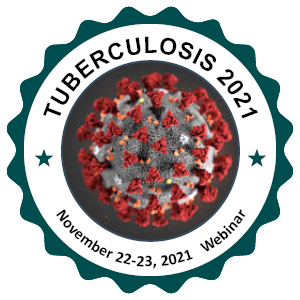
Zulaikah Mohamed
Johor Bahru Public Health Laboratory,Malaysia
Title: Evaluation of the Mycobacterium tuberculosis antigen Rv2031c encapsulated in Siosomes® as a potential tuberculosis vaccine candidate
Biography
Biography: Zulaikah Mohamed
Abstract
New effective tuberculosis (TB) vaccines are urgently needed to control the disease which infects about 10 million people and kills about 2 million people annually. The existing TB vaccine, Bacille Calmette Guerin (BCG), is the only available licenced vaccine which is neither effective in conferring protection in adults nor reactivation of latent TB infection. In the current study, the Mycobacterium tuberculosis (Mtb) protein, Rv2031c, which was predicted to be expressed during active, latent and reactivation stages of TB infection, was selected as a potential TB vaccine candidate. The peptides were predicted to be presented via the MHC-class I and II antigen presenting pathways by >90% of the global population. The silicon-based delivery nanovesicle, Siosomes® was used in this study. The peptides were encapsulated into the Siosomes®, to assess the specific immune response in mice with the use of the adjuvant, Montanide 51VG. After 8 weeks, the humoral and cellular immune responses were determined. The candidate was further evaluated in a mouse challenge model using homologous (MPS2-MPS2) or heterologous (BCG-MPS2) prime-boosting immunization strategy for sixteen weeks. The non-adjuvanted vaccine (PS2) was used as control. The specific IgG1 and IgG2a were increased in mice immunized with MPS2 (p<0.001). Spleen cells obtained from mice immunized with PS2 (p<0.01) and MPS2 (p<0.001) significantly proliferated when stimulated with the specific peptides. Mice immunized with PS2, induced the production of intracellular IFN–g (p<0.01) and IL-2 (p<0.05) by CD4+T cells, while CD8+T cells produced significant expression of IL-4 (p<0.001). MPS2 induced the production of intracellular IFN–g (p<0.05), but lower levels of IL-4 (p<0.001) by CD4+T cells compared to non-immunized mice. Hence unlike PS2, which resulted in a mixed Th1-Th2 response, MPS2 induced better Th1 type immunity (IFN-g and IgG2a), and importantly lower Th2 response based on the lower levels of IL-4. Challenge studies revealed a significant reduction of CFU and inflammatory areas of the infected lung in mice vaccinated with BCG-MPS2 (p<0.001) compared to non-immunized (p≤ 0.001) and BCG immunized (p≤0.05) groups. The finding showed that Rv2031c encapsulated into Siosomes can confer protection against Mtb infection.

